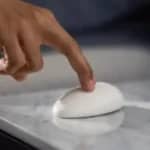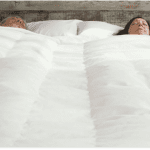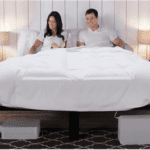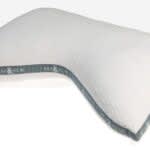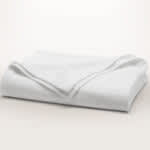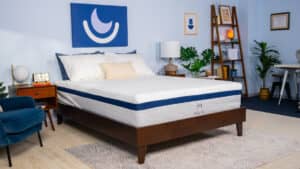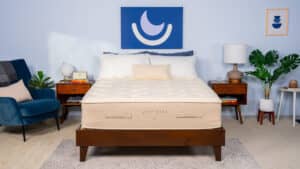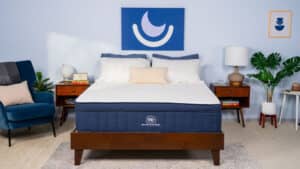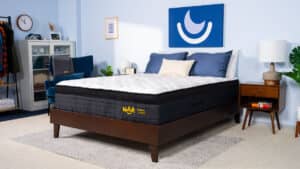At a Glance:
- 65.8% of all U.S. adult survey respondents agree that they should change their mattress every six to eight years.
- The average age of a U.S. mattress is 3 years, 8.5 months.
- 75.6% of respondents own a mattress that is less than 6 years old.
- 19% of respondents own a mattress that is more than 6 years old.
- 44.2% of respondents are considering buying a new mattress in the next 90 days.
- 6.6% of respondents don’t know the age of their mattress.
We spend one-third of our life sleeping, which means our mattresses can wear out over time, sag, and cause discomfort. But how often do we actually replace our mattresses?
Conventional wisdom suggests replacing your mattress every six to eight years, the typical life span of a mattress. According to The Sleep Doctor’s recent survey of 1,250 U.S. adults, that is in fact the norm.
Among survey respondents, 65.8% agree that they should replace their mattress every six to eight years. And even more may be doing it, as 75.6% of respondents have a primary mattress that is less than 6 years old. The average mattress age among all survey respondents was 3 years, 8.5 months.

But six to eight years is not really a magic number range, says Dr. Michael J. Breus, Ph.D., of The Sleep Doctor. The recommendation is part marketing, part expected life span of mattress materials. The biggest factor in when and why we replace our mattresses may be us.
“People should get a new bed when their body tells them [to],” Dr. Breus says.
Let Us Help You Find the Perfect Bed
Answer a few questions to find the right mattress for your unique needs
What Is Our Body Telling Us About Our Mattress?
For Andre Kazimierski, 34, of Chicago, the triggers were chronic aches and pains. He didn’t initially think they were the result of his old mattress. But he had kept his mattress most of his adult life.
“I had no idea mattresses were something that wore out,” Kazimierski says. “It was kind of a revelation to finally purchase a new mattress and have some persistent back and neck pain I’d been dealing with clear up almost overnight.”
Among the 44.2% of survey respondents who said they’d consider replacing their mattress in the next 90 days, 68.7% reported regular back pain for them or their bedmates. Among all respondents, 59% reported having back pain or sharing a mattress with someone who has back pain. A little more than half of the back-pain group, or 51.6%, were considering a mattress purchase in the next 90 days.
Aches and pains or allergic reactions to dust mites and other allergens may be good reasons to change your mattress, Dr. Breus says. If you’re waking two to three times per week with stiffness or soreness in a particular area, then you may need a new mattress, he says.
But pain abatement was not the top reason people cited for buying a new mattress. Instead, respondents cited mattress materials (34.9%), mattress size (33.5%) and age and firmness of existing mattress (tied at 32.4%). Reducing pain resonated among 22.6% of respondents.
David Rubin, certified sleep science coach and lead product tester for The Sleep Doctor, says people often buy new mattresses when they move or because of a major life event, such as switching to a king-size mattress when they begin sharing a bed with a partner.
That could help explain why 42.5% of adults with a mattress less than 6 years old are still thinking about purchasing a new one in the next 90 days.
Familiarity Breeds Contentment?
One other potential factor: We might like the mattress we have.
Overall, respondents rated their primary mattress at 4.1 starts out of 5. Satisfaction waned over time, hitting a low of 3.4 stars among people with a 9-year-old mattress — just beyond the suggested replacement window.
Then something else happens: As we live with our mattress more, our satisfaction level increases again.

In fact, respondents with mattresses more than 6 years old sleep 16 minutes longer each night than those with mattresses that are less than 6 years old. But 70.9% of people with these older mattresses agreed that their mattress is the most important thing they need to get a good night’s sleep, compared to 78.1% of people with newer mattresses.
But can that mattress affect your sleep?
“It would make sense that the product [people] spent the most money on [in their bedroom] would be the thing they felt was the most influential,” Dr. Breus says. He adds that light may actually be the most influential factor for our sleep, followed by sound, temperature, and then the mattress on which we sleep.
Seeking a Materials Upgrade
That hasn’t stopped mattress-makers from attempting to improve mattresses themselves.
“Not only have prices decreased, but the quality of mattresses has also increased,” Rubin says. “New materials like latex and high-density polyfoam have made many varieties of mattresses available on the market last longer.”
Survey respondents with newer mattresses were more likely to have a foam mattress (38.4%) vs. an innerspring model (30.9%), with 38.4% of older-mattress owners going for innerspring vs. foam (23.6%). Both types of mattresses are in production and have their benefits, with innerspring considered more “traditional.”
People with foam or hybrid mattresses also gave their mattresses 4.4 stars out of 5, compared to 3.8 for innerspring.

Back to the matter of cost: Of all respondents, 70.2% agree that mattresses may be too expensive. That increases to 83.8% among people with a mattress older than 6 years old, 19% of all respondents. About 67% of people in households with income below $75,000 as well as those with household income above $125,000 agreed that cost can be a negative factor.
In addition, 59.9% of all respondents agree that disposing of an old mattress is a hassle.
So some of us may make do with what we have. Among respondents with a mattress older than 6 years old, 60.7% try to extend its life by flipping or turning it.
The practice doesn’t apply to every mattress, depending on how it’s made, Dr. Breus says. But 42-year-old Jennifer Hardy of Sacramento, California, makes it standard practice.
“I take a picture of the tag on the mattress so that I know what end the tag was on and which side of the tag was facing up,” she says. “Whenever I move the mattress, I just reference the last photo and do the opposite.”
Making the Right Mattress Choice For You
Although U.S. adults generally follow the mattress-replacement guidance of switching things up every six to eight years, doing so is not always possible. Some 6.6% of adults don’t know the age of their mattress, which can be the case for renters or people in short-term housing or school dormitories.
Not to worry. A good night’s sleep depends not only on your sleep environment, of which your mattress is one part, but also on healthy sleep habits.
But with so many choices of mattress materials, how do we find the best mattress when we need one?
“Bottom line, there’s no perfect mattress out there,” Rubin says. “It comes down to personal preference. If you find a particular mattress helps you sleep better, or relieves your pain, then it’s the right mattress for you.”
Methodology
The survey commissioned by The Sleep Doctor was conducted on the online survey platform Pollfish on Nov. 29, 2022. Results are from 1,250 survey participants in the United States who were ages 18 and older at the time of the survey and sleep on a mattress at their primary residence. All respondents attested to answering the survey questions truthfully and accurately.






